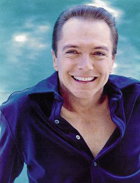
David Cassidy in the News
Cassidy Is Focus Of New Pop Trend
March 12, 1972
By Don Heckman
New York Times
What happened at Madison Square Garden Saturday afternoon was less a musical event than a love feast, less a concert than a symbolic announcement of what pop music might become. The focus of it all was David Cassidy, singer and star of television's “The Partridge Family,” and the current idol of almost every 13-year-old girl in America.
Cassidy, a diminutive, extremely mobile young man who looks 16 but who actually is in his early 20's, moved around the Garden's massive stage like a wind-up version of an updated Elvis Presley, gyrating his pelvis, leaping into the air in wide-spreading splits and trying, with all his might, to project an image of writhing sensuality. Every gesture was lit up by the glare of a thousand bursting flash bulbs.
Cassidy is a still-developing singer with a pleasantly bland voice and a notable absence of rhythmic vitality. Fortunately, his highly professional back-up musicians more than compensate for his mediocre musicianship.
But the significant element here is sensuality and theater, not music. Cassidy's ambiguously sexy prancing is of the same fresh-faced, wide-eyed style that made the early Beatles so successful with teenagers (and so acceptable to parents). And his understanding of the implicit dramatics that he can stimulate when he struts around the stage in his gleaming white jump suit reveals a markedly mature familiarity with the core qualities of show business.
If teen-agers continue to affect the development of pop music the way they have in the past, then David Cassidy may have sounded a clarion call for the future at the Garden.
As the first serious pop talent developed by television, he represents yet another aspect in the growing influence of that maligned medium. At the close of his program he sang his hit song, “Cherish,” and there were people there who would have been very happy to do just that. But I suspect that their affection had more to say about the manipulative powers of television and recordings than it did, about David Cassidy.
